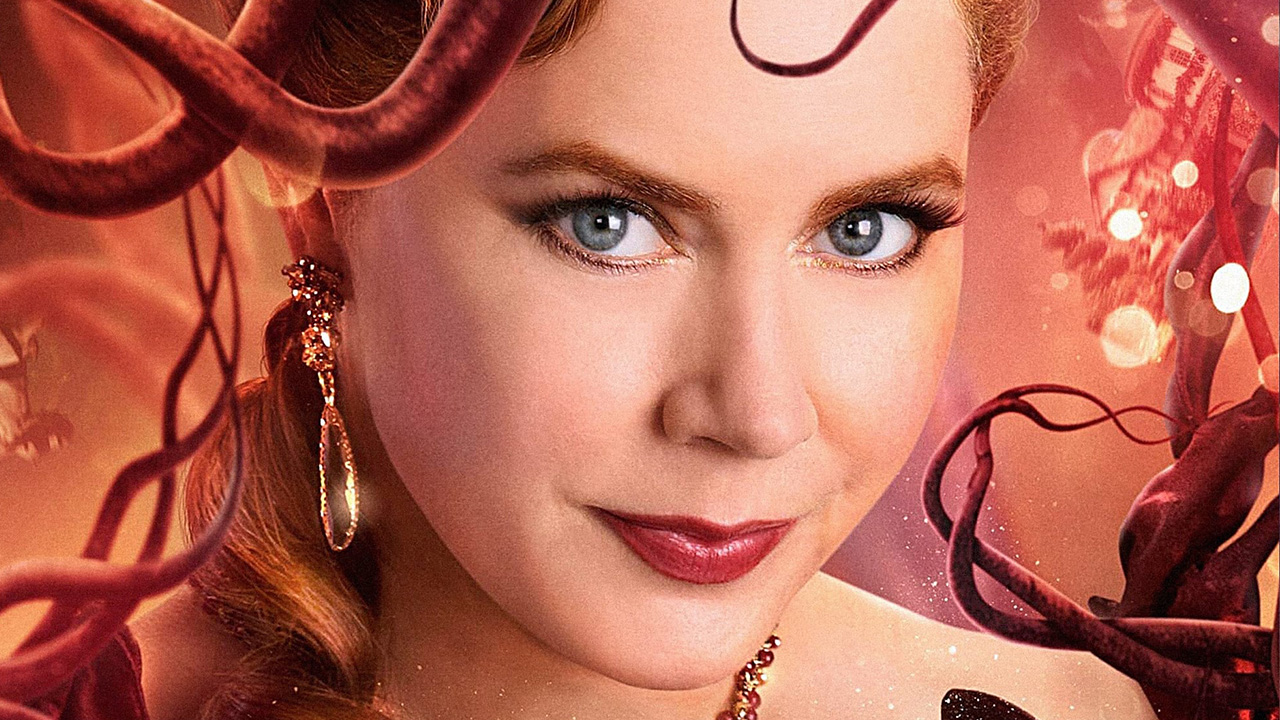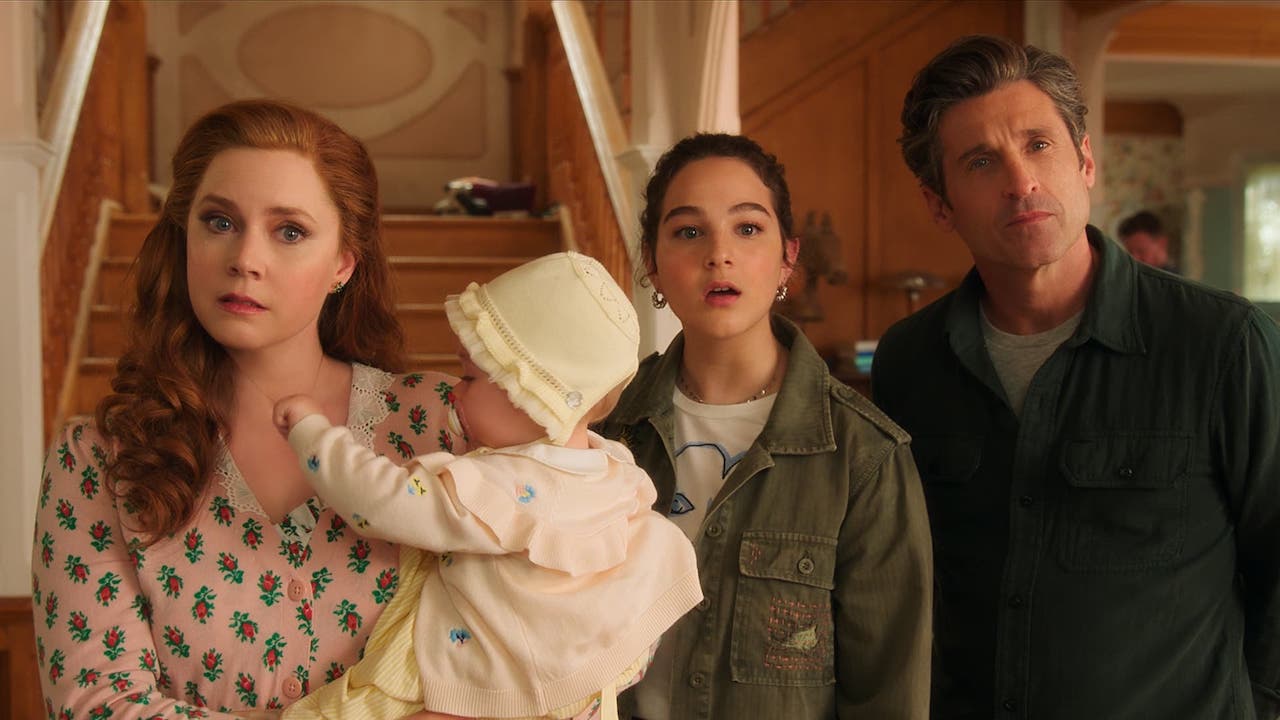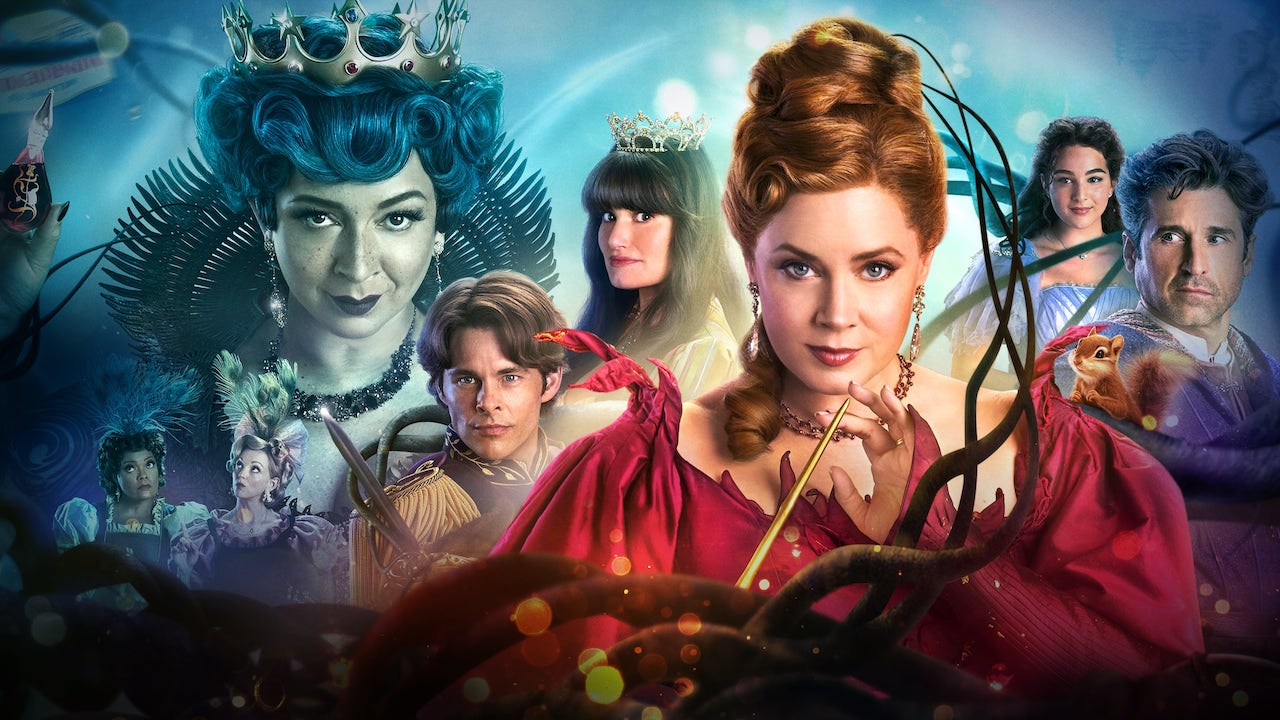At least Amy Adams is having a wicked good time in the uninspired Disenchanted

Some of the fairytale magic has left Giselle and her family in Disenchanted—and it’s missing from the film too. Eliza Janssen fails to spontaneously break into song and dance at the lukewarm sequel.
In fairytales, stepmothers tend to get a bad rap. Nobody ever questions why Cinderella’s dad was dumb or inconsiderate enough to marry such a conniving old biddy, and it’s gotta be tough to enter into an idyllic blended family situation in any case.
In Disenchanted, the sequel to Disney’s gently self-aware 2007 family film, some of the traits assigned to ‘wicked stepmother’-dom aren’t especially egregious in my eyes: is it really so wrong for a confident woman to be ‘ambitious’ and ‘vain’? It’s a big stretch for Amy Adams’ perma-delightful Princess Giselle to let her dark side flourish, but for us viewers the contrast between her usual white bread perkiness and a villainous possession is one of the only reasons to watch Disenchanted.
Hand-drawn animated chipmunk Pip reintroduces us to the mixed-media world of the franchise, beginning its tale “where the old one left off: after happily ever after”. Many of the young fans who once loved Enchanted could well be parents now, so they’ll probably chortle at gags of Giselle and her lawyer husband Robert (Patrick Dempsey)’s mid-life move to the manicured estate of Monroeville.
As Pip tells us, the couple’s New York City flat has become too cramped, especially with a new baby in the mix: “Life got so busy, it felt like a sleeping curse fell on them every night!” Much to the chagrin of Robert’s daughter Morgan (Gabriella Baldacchino, who’s really only an angsty teen in the most mild and Disneyfied of ways), the family makes the change to a new environ of lush lawns and cappuccino-swilling neighbourhood committee moms, where “suburbia” can be handily rhymed with “perturb ya” and “disturb ya” in song.

There are realistic and soulful ideas within Giselle’s, well, disenchantment with settled-down domestic life. Left feeling stagnant in an un-singing, un-dancing world, she bemoans “I used to be good at things”: something I’m sure many Disney princesses felt after their big climatic marriages and wishes come true. Adams brings truth and the character’s usual irrepressible joy to this slow first act, but by gosh does the film pick up once she uses a magic wand to wish for a new and improved fairytale life.
It’s a great excuse for Disney to indulge in some lusty village-wide choreo and plenty of references to their back catalogue that feel far less tacky than they did in the recent Pinocchio remake. Beauty and the Beast especially gets some nods, with anthropomorphised kitchen appliances and one poor barista getting turned into a magic mirror. In this way, Disenchanted is also more than a bit similar to fellow Disney+ production WandaVision, revolving around one nostalgia-obsessed heroine enslaving an entire town into her cosplay fantasy. Neither project bothers to delve any deeper into the troubling existential horror of that idea than can be pleasantly wrapped up by reversing the wish in the third act.

None of the songs in Disenchanted are as catchy as the few we got in Enchanted, sadly, and both leading men (Dempsey and original film MVP James Marsden) are sidelined as quick comic relief. With that first film being so beloved and financially lucrative, many Disneyheads might be surprised that the sequel is a streaming exclusive on Disney+ rather than hitting cinemas. The comparatively cheap-looking, unfluid animation of the film’s brief returns to classic 2D style is the clue here, proving that the studio just hasn’t invested the same degree of care and sarcastic magic into this follow-up.
What does remain absolutely magical, though, is Adams, whose pitch perfect butter-wouldn’t-melt performance gets a delightful added dimension when her wish backfires, slowly turning her into that dastardly archetype of the evil stepmother. It’s a blast to watch Giselle helplessly flash the camera a wicked little expression: her soprano voice gets richer and brassier, her hands prick into camp Gloria Swanson gestures. We’re kept waiting for her obligatory “villain song” for a long time, and when it comes, the tango-esque duet with Maya Rudolph’s nasty queen is worth the wait as Disenchanted’s sole memorable number.
can i just say the duet between amy adams and maya rudolph did not have to go that hard. they both came to set ready that day #Disenchanted pic.twitter.com/yF8DsdEiEU
— jocelynn (@jocelynnvalntin) November 19, 2022
Of course the House of Mouse isn’t willing to be truly subversive enough to let Giselle’s newfound bad side win, and so Idina Menzel, now a full-fledged Disney princess in her own right, shows up at the eleventh hour to belt out a ballad about “love power”.
I can’t help feeling that the entire sequel would’ve achieved more by having a little more dimension in its steadfast binary of good and evil, though. If only Adams had been allowed to keep a little of that winning wickedness by the time her second happy ending is secured: now that’d be really enchanting.

















